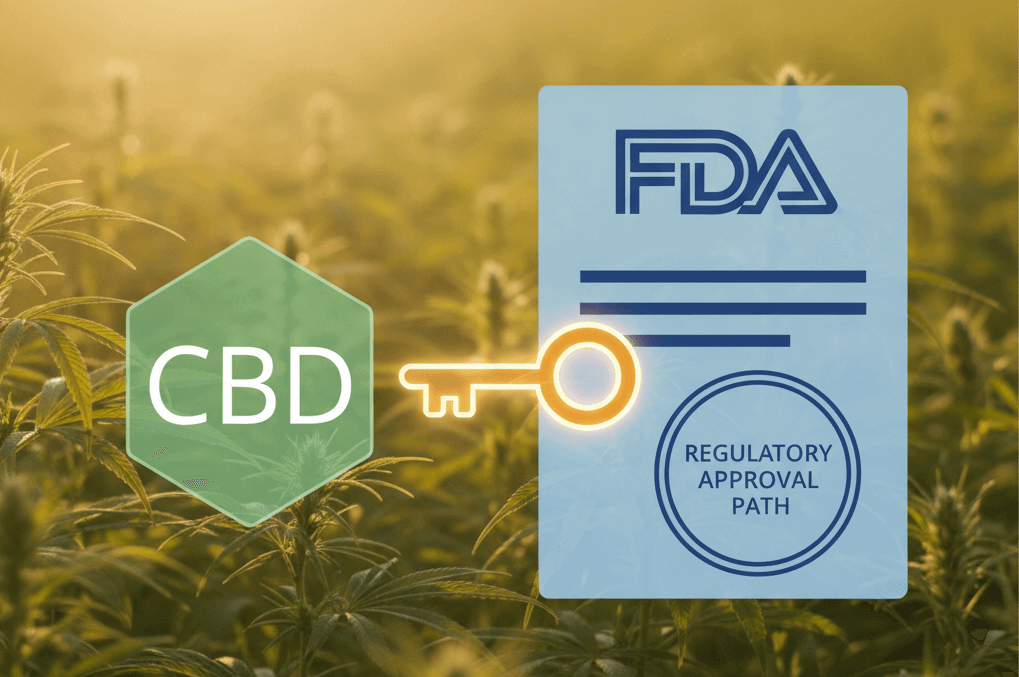
It’s one of the most common questions from new and experienced CBD users alike: Is CBD actually approved by the FDA?
The answer is a classic “yes, but…” that has created significant confusion in the marketplace. While you see CBD products everywhere from online stores to local cafes, the regulatory landscape is far more complex than it appears. A landmark decision in 2018 set the stage for the current market, but understanding the details is crucial for any consumer.
This guide will clear up the confusion. We’ll explain the truth about the one and only FDA-approved CBD medication, what the legal status of your favorite CBD product is, and what the FDA’s current stance means for you.
Epidiolex: The One and Only FDA-Approved CBD
Let’s be perfectly clear: there is currently only one cannabis-derived medication that has been fully approved by the U.S. Food and Drug Administration (FDA). That medication is Epidiolex.
So, what is it, and how is it different from the CBD oil you can buy online?
- It’s a Prescription Drug: Epidiolex is a high-dose oral solution of pure, plant-derived CBD isolate. It cannot be purchased over the counter; it must be prescribed by a doctor.
- It Treats Specific, Rare Conditions: The FDA has approved Epidiolex for the treatment of seizures associated with severe forms of epilepsy: Lennox-Gastaut syndrome (LGS), Dravet syndrome, and Tuberous Sclerosis Complex (TSC).
- It Has Undergone Rigorous Clinical Trials: This is the most critical difference. Epidiolex went through years of controlled, multi-phase clinical trials to prove its safety and efficacy for treating these specific conditions. Consumer CBD products have not undergone this level of scrutiny from the FDA.
The approval of Epidiolex in June 2018 was a historic moment. It was the first time the FDA officially recognized the medical value of a cannabis-derived compound, a decision that triggered a cascade of legal and regulatory changes.
The 2018 Farm Bill and the Mainstreaming of Hemp
The FDA’s approval of Epidiolex created a logical paradox for the Drug Enforcement Administration (DEA). At the time, CBD was a Schedule I substance, meaning it had “no currently accepted medical use.” Since the FDA had just proven it did have a medical use, the DEA was forced to act, eventually reclassifying Epidiolex to Schedule V, the least restrictive category.
An even bigger change came just months later.
In December 2018, the Agriculture Improvement Act (commonly known as the 2018 Farm Bill) was signed into law. This monumental piece of legislation federally legalized the cultivation of hemp by removing it from the definition of marijuana under the Controlled Substances Act.
Under this law, cannabis containing less than 0.3% Delta-9 THC by dry weight is legally defined as hemp, and its extracts, including CBD, became federally legal to produce and sell. This single act is what opened the floodgates for the consumer CBD market we see today.
The FDA’s Current Stance on Consumer CBD (As of September 2025)
This is where the confusion for consumers comes in. While the 2018 Farm Bill legalized hemp-derived CBD, it did not give CBD products a free pass from FDA oversight.
As of 2025, the FDA’s position is clear:
- CBD Products are Not Approved as Drugs: Outside of Epidiolex, the FDA has not approved any other CBD product to treat, cure, or prevent any disease. Therefore, any company claiming their CBD oil can “cure cancer” or “treat anxiety” is breaking the law.
- CBD is Not Approved as a Dietary Supplement: The FDA has currently concluded that CBD products cannot be legally sold or marketed as dietary supplements. This is a complex legal issue they are still evaluating.
- The FDA’s Main Concern is Public Safety: The FDA actively monitors the market and issues warning letters to companies that make illegal health claims, sell products with more THC than allowed, or have products contaminated with pesticides or heavy metals. Their primary concern is the lack of regulation and the potential for consumers to be harmed by poor-quality products or to use CBD in place of proven medical treatments.
Conclusion: How to Navigate the CBD Market Safely
So, what does this all mean for you?
It means that while the CBD oil you buy is federally legal, it exists in a largely unregulated space. The responsibility for safety and quality falls on the consumer. The landmark approval of Epidiolex proved that CBD has legitimate therapeutic potential, but it also highlighted the need for rigorous testing and standards—standards the consumer market often lacks.
When you shop for CBD, you are voting with your dollar. Always choose reputable brands that provide up-to-date, third-party lab reports (Certificates of Analysis) for their products. This is the only way to verify that your product is safe and contains the amount of CBD it promises.
For more information about safety in using CBD, check out our comprehensive Guide.
Stay Informed on the Latest in CBD Wellness!
The world of CBD is always evolving. To stay up-to-date on the latest research and product guides, sign up for our newsletter for expert insights delivered straight to your inbox.

